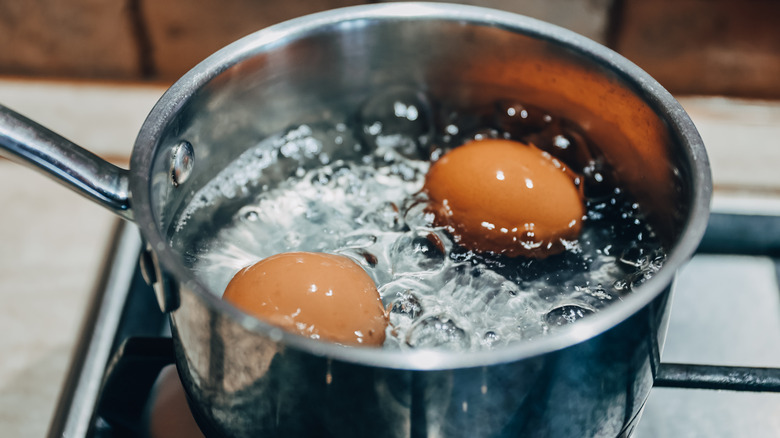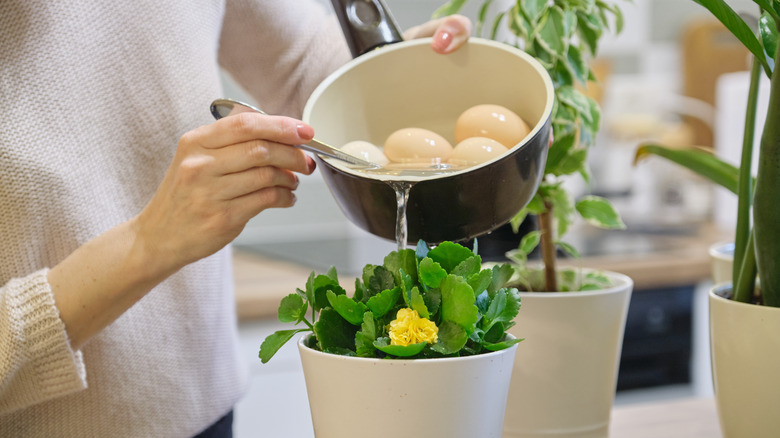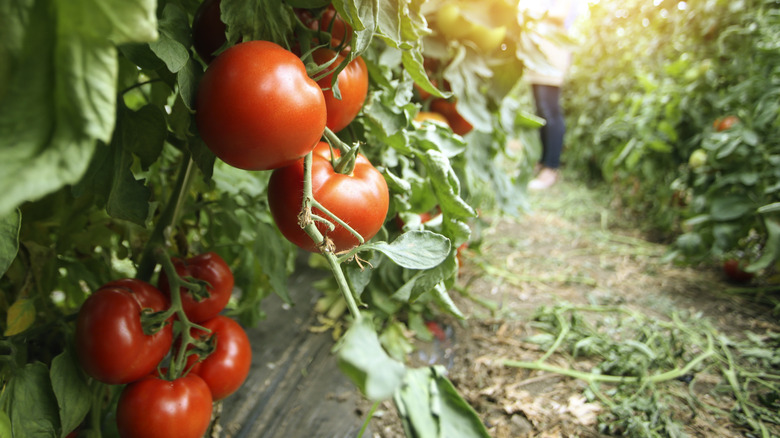The Genius Egg Water Hack That Works Wonders For Your Garden
Every gardener has a green thumb hack that does wonders for their plants. Whether that's perfecting their fertilizer recipe or using pepper to keep pests at bay, everyone has their secret sauce. If you're looking for a new one to add to your rotation, then look no further than saving your hard-boiled egg water. It will help your plants explode with growth, making them happy and healthy in your yard.
Eggshells naturally contain lots of calcium, which keeps the soil's pH neutral at 6.0 to 6.5. This pH level allows plants to absorb nutrients more readily, build plant tissue, and boost their growth. On the other hand, plants lacking calcium experience all sorts of ailments that make them look withered and sickly. For example, you'll notice flowers and buds prematurely dying, leaving a mess on your sidewalk or yard. You can also see leaf tip burn, dying root or stem tips, and a change in fruit taste and firmness, causing them to rot faster. If you want to avoid that, then do the egg water hack.
How to add more calcium to the soil
Since eggshells are a rich source of calcium, you will want to add them directly to the soil. However, it's not enough to sprinkle broken eggshells in your garden beds or vegetable patches. That's because eggshells don't break down quickly, which means your plants won't access the calcium until they decompose, which can take weeks if not months. To speed up the eggshell fertilizer process, skip the shells and instead water your plants with the water used to boil eggs.
The calcium from the shell leaches into the water as you boil it, making it sufficiently calcium-rich. Rather than making your plants break down the physical eggshells, you can instead hand-deliver the calcium by pouring the water into the soil. To do so, all you need to do is boil a couple of eggs in a large pot of water. The more you boil, the more calcium-rich the water will be. Once done, let the water cool to room temp so as not to scald the plants and ruin their roots. Then simply pour it into the soil, allowing them to reap the benefits.
Why this works
Soil can either naturally lack calcium or be depleted by adding fertilizers with high levels of potassium, magnesium, or sodium. The only way to know for certain is by doing a professional soil test, but if you would rather not jump through hoops, then you will also know by the quality of your plant. If it is healthy and suddenly experiences browning or yellowing leaves, rotting fruit, spent blooms, and bitter fruit pits, then chances are it needs more calcium and fast.
That's because calcium helps build plant tissue and cell walls, which in turn stimulates root system development, fruit growth, and photosynthesis. It's an essential ingredient needed for development, and plants that lack it visibly suffer. New growth, such as flower buds, young leaves, new root tips, and growing fruit, cannot form correctly, leaving them withered and malformed. Adding a healthy dose of calcium to the soil regularly helps prevent this.


